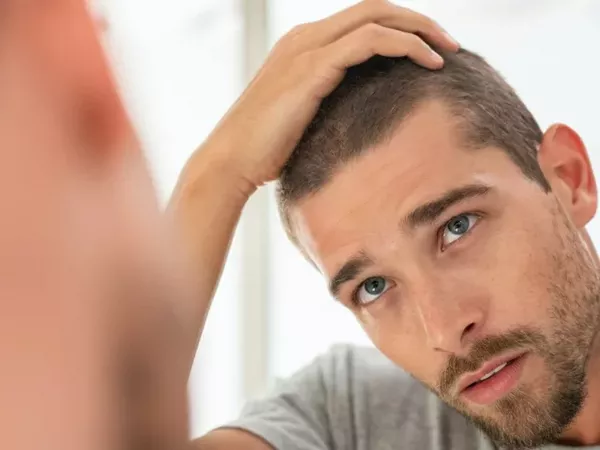Hair loss is a common concern for many men, and while genetics play a significant role, lifestyle factors can also influence the health of your hair. Fitness and nutrition are two key components of a healthy lifestyle that can impact male hair loss. In this article, we will explore the relationship between fitness, nutrition, and hair health, as well as provide tips on maintaining a balanced lifestyle for healthier hair. Additionally, we will answer frequently asked questions to provide a comprehensive understanding of this topic.
I. The Link Between Fitness and Hair Health
Exercise and Circulation
Regular exercise contributes to improved overall health and can indirectly benefit hair health. Physical activity promotes better blood circulation, including to the scalp. This increased blood flow can deliver more nutrients and oxygen to the hair follicles, potentially aiding in hair growth.
While exercise is a valuable part of a healthy lifestyle, it’s important to note that excessive or extreme exercise, especially when coupled with inadequate nutrition, can lead to stress on the body, potentially contributing to hair loss. Balance is key.
Stress Reduction
Stress is a well-known factor in hair loss, and exercise can be an effective stress-reduction strategy. Physical activity releases endorphins, which are natural stress relievers. Lower stress levels can help mitigate hair loss triggered or exacerbated by chronic stress.
II. Nutrition and Hair Health
Nutrient-Rich Diet
Nutrition plays a crucial role in the health of your hair. A balanced diet that includes a variety of nutrients can support strong and vibrant hair. Key nutrients for hair health include:
Protein: Hair is primarily made of protein, so adequate protein intake is essential for healthy hair growth.
Vitamins: Vitamins like biotin, vitamin D, vitamin E, and vitamin A play roles in hair growth and maintenance.
Minerals: Minerals such as iron, zinc, and selenium are vital for hair health.
Omega-3 Fatty Acids
Omega-3 fatty acids, found in fatty fish, flaxseeds, and walnuts, have anti-inflammatory properties that can benefit the scalp and hair follicles. These healthy fats support overall hair health and may help reduce hair loss.
Hydration
Proper hydration is essential for overall health and can also impact hair health. Dehydration can make hair dry and brittle, leading to breakage. Ensure you are drinking enough water daily to keep your body and hair adequately hydrated.
III. Tips for Maintaining Healthy Hair Through Fitness and Nutrition
Balanced Diet: Consume a well-rounded diet rich in fruits, vegetables, lean proteins, whole grains, and healthy fats to provide essential nutrients for hair health.
Stay Hydrated: Drink plenty of water to maintain proper hydration, which supports healthy hair growth.
Regular Exercise: Engage in regular physical activity to improve blood circulation and reduce stress, both of which can benefit your hair.
Manage Stress: Incorporate stress-reduction techniques such as mindfulness, meditation, or yoga into your routine to minimize the negative impact of stress on your hair.
Consult a Healthcare Professional: If you are experiencing significant hair loss or nutritional deficiencies, consult with a healthcare provider or dermatologist for personalized advice and treatment options.
IV. FAQs on Fitness, Nutrition, and Male Hair Loss
Q1: Can exercise alone reverse hair loss?
Exercise can indirectly support hair health by improving circulation and reducing stress, but it is not a standalone solution for reversing hair loss caused by genetic factors or certain medical conditions.
Q2: Are there specific foods that promote hair growth?
A balanced diet that includes a variety of nutrients is essential for hair health. Foods rich in protein, vitamins, minerals, and omega-3 fatty acids can promote healthy hair growth.
Q3: Can extreme exercise lead to hair loss?
Excessive or extreme exercise, especially when combined with inadequate nutrition, can lead to physical stress on the body, potentially contributing to hair loss. Balance and moderation are key.
Q4: Are dietary supplements necessary for hair health?
A well-balanced diet should provide most of the nutrients needed for healthy hair. However, in cases of nutrient deficiencies, supplements may be recommended under the guidance of a healthcare provider.
Q5: Can stress-related hair loss be reversed through lifestyle changes?
Reducing stress through lifestyle changes such as exercise, relaxation techniques, and a balanced diet can help improve hair health and slow down or reverse stress-related hair loss in some cases.
In conclusion, fitness and nutrition are integral components of a healthy lifestyle that can have a positive impact on male hair health. A balanced diet rich in essential nutrients, regular exercise to improve circulation and reduce stress, and effective stress management techniques can all contribute to healthier, stronger hair. While these lifestyle factors can support hair health, it’s important to remember that genetic factors also play a significant role in male hair loss. If you have concerns about hair loss, consulting with a healthcare provider or dermatologist can provide personalized guidance and treatment options to address your specific needs.

